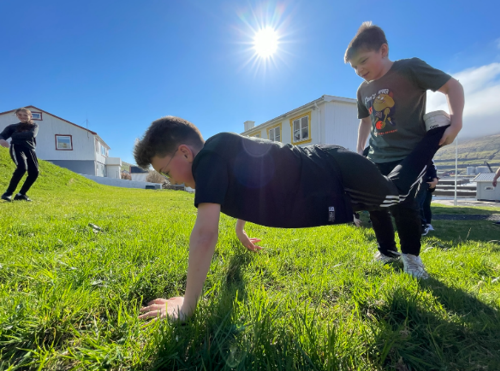Funded by Nordic Council of Ministers Nordic Co-operation between Québec and the Nordic countries.
Turning inactivity into action: FIT FIRST FOR ALL program inspires healthier futures for Arctic children

When Helgi Winther Olsen's trip to this year's My Northern Project competition was cancelled, the opportunity to share his work on FIT FIRST FOR ALL program in person was lost. However, the findings of his project, which tackles physical inactivity among Nordic youth, are too important to overlook.
This innovative project, piloted in the Faroe Islands, shows how structured, inclusive activities can significantly improve children's fitness, well-being, and long-term health. We have asked Helgi to share his findings with UArtic's audience.
"It was with great disappointment that I found myself at Vágar Airport in the Faroe Islands on Thursday, October 18th, watching my flight to Reykjavík get canceled. I had been looking forward to presenting my Northern Project at the Arctic Circle Meeting and connecting with others for inspiration and collaboration.
While the opportunity to share the project in person was lost, it remains important to highlight its findings here. The challenges it addresses are significant, not just for me, but for all of us. Although the Nordic and Arctic regions are known for prosperous living, we face common issues that cannot be ignored. Alongside climate change and geopolitical concerns, there is a quieter but equally pressing challenge which we literally cannot run away from because we lack the cardiovascular fitness to do so - physical inactivity contributes to 8.9 percent of all deaths globally.
Regular exercise can make a profound difference, and children need at least 60 minutes of activity daily. Yet only about 20 percent meet this target, with rates dropping further during adolescence, particularly among girls. This trend impacts physical fitness, body composition, and well-being, creating a worrying trajectory. While the reasons behind this are complex, it is clear that modern life involves less movement, less play, and less enjoyment of physical activity.
Research shows that the more skilled someone is at an activity, the more they tend to enjoy it. Physical activity requires a certain level of fitness and basic skills to feel enjoyable rather than burdensome. For many children, this creates a barrier that can be difficult to overcome, particularly for the 80 percent who are not physically active.
With this challenge in mind, the FIT FIRST FOR ALL program was introduced in a village school in the Faroe Islands in early 2023. Over 10 weeks, all 200 pupils aged 7 to 16 took part in three weekly 40-minute sessions of structured, high-energy activities designed to be fun and inclusive. The program, developed at the University of Southern Denmark, included over 20 sports themes with more than 200 pre-made sessions and emphasized teamwork and enjoyment over competition. The program was Integrated into the school’s schedule, while a neighboring school of similar size and demographics served as a control school with an unchanged curriculum.

The program produced encouraging results. Cardiovascular fitness increased by 31 percent. Body composition also improved, with muscle mass rising by 8 percent and fat percentage dropping by 9 percent. Physical well-being scores improved by 5 percent, though the changes were more pronounced in boys than in girls, a finding that calls for further exploration.

These results are particularly promising for small communities in the Nordic and Arctic regions, where similar interventions could have significant health benefits. The FIT FIRST FOR ALL program demonstrates how simple, structured approaches that are easily scalable and sustainable can address physical inactivity and help children develop the skills and fitness to enjoy being active.
While more work remains to tailor interventions to local needs, there is reason to believe this program could become a shared effort - a Northern Project for all of us. With continued research and collaboration, it has the potential to help children overcome barriers and lead healthier, more active lives."
Written by Helgi Winther Olsen, PhD student, Assistant Professor, Physical Education & Exercise Science, Faculty of Education, University of the Faroe Islands.
Research profile: https://www.pure.fo/en/persons/helgi-winther-olsen

****
The first publication of three of the PhD-project is available in Frontiers in Public Health. It investigates the findings on health-related physical fitness. The second publication that investigates Health Related Quality of Life and well-being is in a peer-review process while the third publication that dives into acute responses during the FIT FIRST activity sessions is under final construction.
https://www.frontiersin.org/journals/public-health/articles/10.3389/fpubh.2024.1419824/full
My Northern Project is a science popularization contest in which students introduce their research to a broad audience, with the aim to summarize potentially complex topics into easily understandable presentations and promote the transfer of knowledge.
